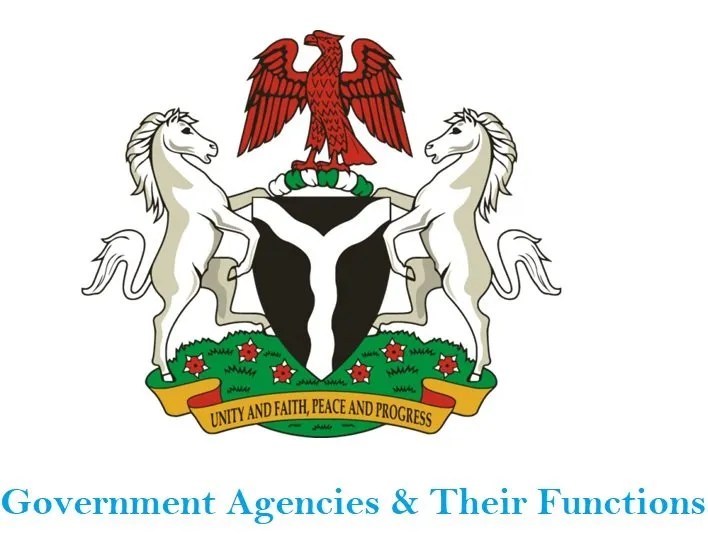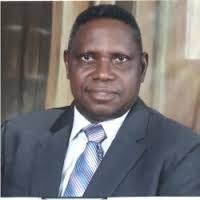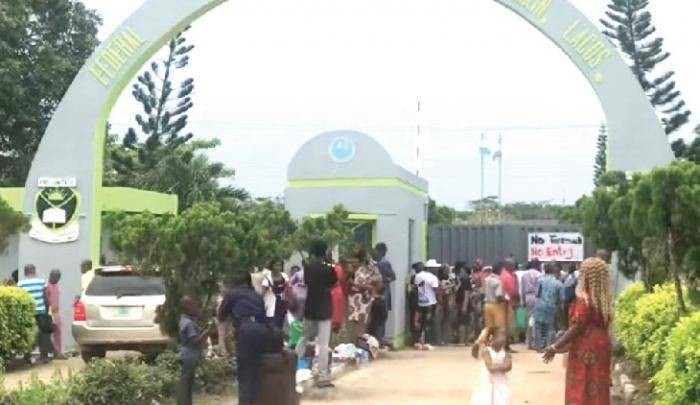
The federal government is a large and complicated entity that contains many different agencies. It can be challenging to keep track of all the departments, their functions, what issues they handle, and how they interact with one another. This list provides an overview of some of the most critical agencies in our country’s governance system.
In this post I will be listing the various government agencies and parastatals in Nigeria and their functions. These agencies are set up to meet certain needs. Truth be told, agencies are being set up from time to time when the need arises and majority of Nigerians do not know the what available agencies and their heads as well as what they exist for. Oftentimes there is duplication of functions amongst these agencies. A perfect example was the recent case where the EFCC, NDLEA and the DSS were fighting over his custody an internet fraudster. This post will intimate you about the major and primary functions and duties of the under-listed government agencies and all you need to know about them.
This article is also available in PDF format for free download which is essential for referencing and research purposes.
I have tabulated the list of Nigerian government agencies as well as their responsibilities for ease of identification and referencing.
List of Government Agencies in Nigeria and Their Functions
| Government Agency | Functions and Responsibilities |
| 1. Nigerian Security and Civil Defence Corps (NSCDC) | The NSCDC is a security support organization that helps to maintain safety in Nigeria. It was established in 2003 by the Nigerian Security and Civil Defense Act. This law mandated state civil defense corps throughout Nigeria, with each of these organizations being supervised by police forces within its respective jurisdiction. This legislation aimed to have an increased ability to protect against domestic threats. The federal government gave funding priority to vulnerable areas or at high risk of attack from outside sources based on their state’s population size, level of wealth, geographic location, previous conflicts involving foreigners, and history with criminal activity such as terrorism or trafficking. This funding priority led to the NSCDC gradually assuming responsibility for terrorism prevention, anti-drug activities, and border control. |
| 2. Nigerian Police Force | The Nigerian police force is the largest law enforcement organization in Nigeria, and its duties include maintaining peace throughout the country and enforcing criminal justice. This task involves everything from catching criminals to investigating crimes that have been committed. The police also provide traffic control, crowd management during emergencies or disasters, community policing programs for minors and adults, crime prevention awareness campaigns through schools and churches. They also organize breathalyzer testing stations at roadsides where drivers can be randomly checked for alcohol intoxication levels before being allowed to continue driving their vehicles on public roadways. Traffic police are vital because they monitor major thoroughfares throughout cities and towns across Nigeria’s many different states using hand signals. This system directs them to respond when encountering weaves in the road, various types of vehicles making their way along these routes on foot or by car, and street vendors crossing streets without using designated pedestrian walkways. |
| 3. Nigeria Export Processing Zones Authority (NEPZA) | The Nigeria Export Processing Zones Authority was established in 1992 by the Nigerian government to promote international trade and reduce poverty among citizens. This organization aims to create jobs for local workers to support themselves through legitimate means rather than resorting to crime or illegally smuggling goods across borders, reducing employment opportunities within these areas. To accomplish this task, NEPZA provides tax incentives such as an exemption from income taxes on profits generated from exports along with import duty waivers on all equipment used in production processes carried out at EPZ sites throughout Nigeria’s many different states. It allows businesses operating within these facilities to be more competitive when producing products while still paying their employees’ fair wages. |
| 4. Economic and Financial Crimes Commission (EFCC) | The EFCC was established in 2003 to prevent, detect, and investigate public officials’ corruption cases. This organization has the power to charge individuals for offenses related to money laundering or embezzlement through their current position without evidence that they have committed a separate crime involving physical harm against another individual. Those charged will then be brought before an investigative judge called a Chieftain Magistrate within 72 hours after being detained into police custody. They can either consent to remain silent or refute allegations against them until enough information is gathered during this investigation that proves their guilt. Once these conditions are met, those found guilty will receive punishment depending on what offense has been violated. The severity is based on how much money was stolen or laundered during this illegal activity. |
| 5. Federal Road Safety Corps (FRSC) | The FRSC was established in 1988 and ensures that motorists traveling along Nigeria’s many roads stay safe. This task involves maintaining safety standards for drivers and passengers and ensuring that pedestrians using designated crossing paths at intersections or traffic lights remain out of harm’s way by keeping them clear from moving vehicles. The FRSC is currently composed of over 14000 corps members across Nigeria’s 36 states, including the Federal Capital Territory (FCT). These individuals receive training on correctly identifying road hazards such as damaged pavement, which could cause a person traveling in any vehicle to lose control before crashing into another object or individual nearby. It may occur if they attempt to make a sharp turn while swerving around this obstacle in their path without proper knowledge about what these potential dangers may be beforehand. In addition, motorists can expect to receive a ticket if they are caught speeding along one of these routes. |
| 6. The Central Bank of Nigeria (CBN) | The Central bank of Nigeria is responsible for overseeing the banking system here in Nigeria, which allows citizens to save their money through various means such as opening up a savings account with one or more banks located within cities all across this country. This banking agency is headquartered in the capital city of Abuja. It was founded in 1950 as a federal bank that works with other agencies to oversee all remaining financial institutions found throughout significant cities within every state. This goal is achieved through its policies and regulations, designed to support economic growth across various industries located throughout Nigeria today. It also works with other ministries to create new economic policies that help transform this nation into a more developed one while ensuring the safety of currencies being used by citizens living here in Nigeria at all times. So, they won’t be defrauded through counterfeiting or theft on any level within their daily lives. This way, everyone here will rest easy knowing that all their hard-earned money is safe and sound. |
| 7. National Agency for the Prohibition of Trafficking in Persons (NAPTIP) | The NAPTIP was established in 2003 to prevent human trafficking across many different states within Nigeria. This organization has partnered up with other branches such as the EFCC and military police, who are also involved in preventing or stopping the criminal activity that may involve people being smuggled into another country illegally. They will be forced into slave labor under conditions that do not meet international standards set forth by groups like the United Nations (UN). Those found guilty of violating these laws can expect to receive punishments including prison sentences if convicted, fines, restitution orders made out towards victims, or all three depending on what offense is committed at fault. |
| 8. National Drug Law Enforcement Agency (NDLEA) | NDLEA is responsible for preventing the illicit trafficking of narcotics across state lines within Nigeria’s borders, to other countries near Nigeria, or to areas that lead into other parts of West Africa where drug smugglers may be attempting to transport these types of substances. When this offense is detected by passing officers who work for the NDLEA, they will then detain these individuals and bring them before a judge. This act is to make formal charges against them concerning their involvement with trafficking drugs at some point before being caught doing so illegally. If they are found guilty of this offense, the judge may issue a sentence, including the death penalty, for those who attempted to smuggle large quantities of drugs across borders or were caught selling them in smaller amounts. |
| 9. Securities and Exchange Commission (SEC) | The SEC was formed in 1934 to provide oversight of the Nigerian Stock Exchange. It is responsible for issuing licenses, performing audits on publicly traded companies, and enforcing laws that protect investors from fraud or other types of illegal activities that could result in the loss of their investments. This agency also ensures that all companies registered with the SEC follow the guidelines of Parliament and Nigeria’s constitution. In addition, this branch of government also works towards regulating and enforcing laws concerning market behavior such as insider trading practices or price-fixing between different corporations operating near one another where illegal collusion is taking place at fault. The agency will then impose fines or revoke business licenses from those businesses caught engaging in these types of activities. Primarily if they cannot provide evidence through investigations that were satisfactory enough for them to believe it had not occurred without their knowledge beforehand during a specific period before charges were pressed against them originally. |
| 10. Corporate Affairs Commission (CAC) | The Corporate Affairs Commission (CAC) was established in 1990 and is responsible for developing policies, providing guidance to different businesses registered with the SEC, and ensuring that all companies registered as corporations in Nigeria follow a standard set forth by Parliament. When this is not done or when laws have been violated, they will launch investigations that could potentially result in fines being imposed against those believed to be responsible for these offenses at fault. In addition, those individuals found guilty of violating Nigerian law through their actions related to business may receive prison sentences if convicted. However, it depends on what offense has taken place and how much money was involved in illegal transactions made without government approval beforehand. |
| 11. Federal Inland Revenue Service (FIRS) | The Federal Inland Revenue Service (FIRS) was established to collect taxes and then redistribute those funds into the country’s treasury. This agency works with local authorities, police forces, and other state agencies such as customs officials who work at all international ports of entry located within Nigeria. The latter is to secure these tax revenues from being lost or stolen before they can be appropriately distributed between different areas for public use. This branch of government also helps develop strategies surrounding how much money businesses should collect each year towards taxation against future profits. It will pay off the Nigerian government’s debts due to unpaid loans made through foreign banks and interest rates. This amount is usually based upon the total yearly revenue earned during a specific period. |
| 12. National Identification Management Commission (NIMC) | The National Identification Management Commission (NIMC) was founded in 2007 to create a national database containing essential information about every person living in Nigeria. This agency is responsible for creating a system that will allow individuals to have an identification card which must be carried at all times by anyone who wishes to participate within the Nigerian economy as a citizen of this country, whether they are employed or not. This information includes names, date, place of birth, the current address where someone resides currently along with any other personal details about someone’s life such as their ethnicity, marital status if so desired by them, the religion practiced if chosen voluntarily as well as other vital data concerning one’s existence here within Nigeria today. In addition to helping those looking for employment find jobs more quickly, especially when there may be high unemployment rates across various cities throughout the country, this agency also ensures that citizens receive medical treatment when they need it most promptly. |
| 13. The Nigeria Customs Service (NCS) and the Nigerian Ports Authority (NPA) | The Nigeria Customs Service (NCS) is responsible for collecting tariffs that have been placed on imported goods from outside sources who wish to sell their products within the country here inside of Nigeria by its government. However, before any items can be cleared through customs after being shipped into one of the nation’s major port cities, those importing these goods into Nigeria must follow a transparent process to ensure that they are not being legally imported. As a result, all items shipped from foreign countries outside of Africa must go through customs first before they can be released onto local markets or sold within retail shops across various cities here inside of Nigeria as well as airports if so desired for this purpose. This agency is responsible for overseeing the pricing of all imported goods to ensure that prices don’t become too high or too low, affecting how much people are willing to pay when shopping around within stores. Additionally, it works closely with other agencies such as the Nigeria Ports Authority (NPA) to oversee warehouses throughout major seaports and near airports. Items are stored in these places until they can be shipped out again through customs back towards their original destination or sold to local markets across various states inside Nigeria. This way, there won’t be any problems due to potential risks like security issues. |
Other Government Agencies in Nigeria and their duties continues below..
| 14. National Pension Commission (PENCOM) | The National Pension Commission (PENCOM) function in the following capacities:
|
| 15. Tertiary Education Trust Fund (TETFUND) | This agency acts as an intervention body set up to provide secondary support to all level of public tertiary institutions with the main goal of using funding alongside project management for the rehabilitation, restoration and consolidation of Tertiary Education in Nigeria. The major function of TETFUND is Funding of all public tertiary educational institutions in the ratio of 2:1:1 as between Universities, Polytechnics and College of Education. |
| 16. National Senior Citizens Center (NSCC) | Senior Citizens are the aged Nigerians who require extra care and love. The commission was set up to not just fight for their welfare but also provide an ambient environment where they can live peacefully. |
| 17. National Commission for Refugees Migrants and Internally Displaced Persons | The National Commission for Refugees, Migrants and Internally Displaced Persons is one of the government agencies in Nigeria that functions as the coordinating body for all migration related issues. In addition, The National Commission for Refugees, Migrants and Internally Displaced Persons possess the major responsibility for ensuring that all the different actors involved carry out their mandates within certain agreed standards and for the purpose of achieving the core objectives. The commission also works with the National Population Commission (NPopC) hand-in-hand with the Working Group on Migration Data Management (WGMD) for collection of data and information. The National Commission for Refugees, Migrants and Internally Displaced Persons considers itself a protection and a humanitarian body dedicated to ensuring that the right of its persons of concerns are always upheld. |
| 18. North East Development Commission (NEDC) | This agency was set up to cater for the north eastern part of Nigeria ravaged by terrorist activities and other natural disasters. They provide relief materials to displaced people and act as a shield until they are integrated back into the society. |
| 19. National Emergency Management Agency (NEMA) | NEMA is a very popular government agency. The agency is saddled with the responsibility of coordinating resources towards efficient and effective disaster prevention, preparedness, mitigation and response in Nigeria. It functions in the following capacities: a) Coordination. b) Disaster Risk Reduction c) Search and rescue. d) Geographic Information System, Advocacy e) Relief and rehabilitation f) Planning, research and forecasting. |
| National Commission for Persons With Disabilities | As the name implies, the National Commission for Persons with Disabilities as an agency functions as the bedrock for such category of persons. They act as caregivers to people living with disabilities of all kinds. In addition, they empower such persons to help them become more useful to themselves and the society as a whole |
Click ⇒ HERE to download the PDF doc for the list of Nigerian Government Agencies.
Conclusion
Various government agencies in Nigeria work together with other entities to perform their duties in harmony with other agencies to ensure the smooth running of the government which in turn provides better life and guaranty the safety and well-being of all citizens and persons within the shores of the country. They play a vital role in their various sectors to ensure that citizens’ lives are protected and improved.
What is your take on the list of government agencies and their functions, your contributions are welcome if you have any, simply send it through the comment section below so other readers could also benefit from your knowledge.




